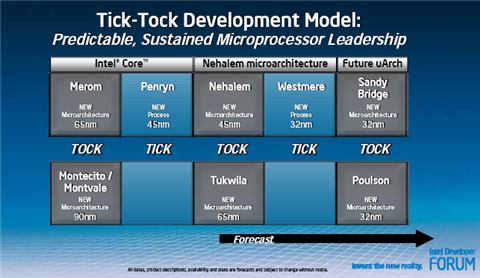Intel: We're on track for 32 nanometer manufacturing

Intel said Wednesday that it has completed the development phase of its next manufacturing process that will shrink chip circuits to 32 nanometers.
The milestone means that Intel will be able to push faster, more efficient chips starting in the fourth quarter.
In a statement, Intel said it will provide more technical details at the International Electron Devices Meeting next week in San Francisco. Bottom line: Shrinking to a 32 nanometer is one more step in its "tick tock" strategy, which aims to create a new architecture with new manufacturing process every 12 months.

While that strategy is unmatched, it's unclear whether customers will see Intel's tick tock plan as a huge selling point in a downturn. For instance, AMD executives have quietly begun highlighting the risks involved with shifting architectures so quickly. During its Shanghai server chip launch one of AMD's big selling points was that customers only needed an easy BIOS update to upgrade. There's a good reason for that though: It's nearly impossible to keep pace with Intel. AMD is also trying to shift the playing field to virtualization and power consumption.
Intel is obviously betting that its rapid-fire advancements will produce performance gains so jaw dropping that customers can't resist.
As far as the nuts and bolts go, here's how Intel described its upcoming paper:
The Intel 32nm paper and presentation describe a logic technology that incorporates second-generation high-k + metal gate technology, 193nm immersion lithography for critical patterning layers and enhanced transistor strain techniques. These features enhance the performance and energy efficiency of Intel processors. Intel’s manufacturing process has the highest transistor performance and the highest transistor density of any reported 32nm technology in the industry.